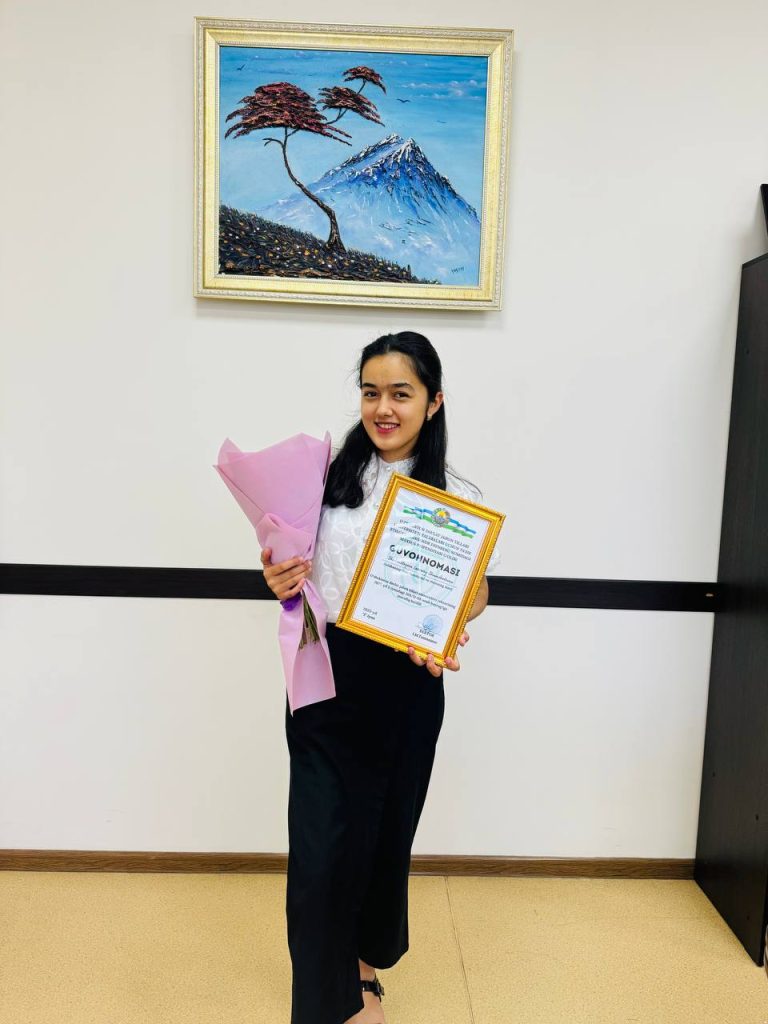
This article presents the inspiring journey of Shukurilloyeva Lazzatoy Shamshodovna — recipient of the prestigious Faynberg Scholarship. It explores her deeply personal and intellectual encounters with the legacy of Russian poet Aleksandr Faynberg, her collaboration with renowned translator Rustam Musurmon, and her own contributions to making Faynberg’s poetic heritage accessible to English-speaking audiences.
More than a story of achievement, this piece reflects on cultural devotion, literary translation, and the profound impact of scholarship as a bridge between nations.
Article Title:”In the Footsteps of Faynberg: Scholarship, Poetic Legacy, and the Intellectual Journey of Shukurilloyeva Lazzatoy Shamshodovna”
More Than a Scholarship: My Journey with Faynberg’s Legacy “To love a land not by birth, but by heart — is the poetry of belonging.”— A. A. Faynberg
When I first heard the name Aleksandr Arkadyevich Faynberg, I didn’t yet know he would soon become an anchor in my intellectual and emotional world. At the time, I was simply a student looking to better understand literary translation — to make meaning move across languages without losing its soul.Little did I know that this quest would lead me deep into the life and poetry of a man who loved my homeland — Uzbekistan — with astonishing sincerity.
Faynberg was a Russian poet. But his soul seemed to have crossed borders before his poems ever did.He revered Uzbekistan not merely as a distant land, but as something akin to a spiritual home.I was moved to learn that on Alisher Navoi’s birthday, Faynberg would go to the Milliy Bog’ (National Park) in Tashkent — sometimes even before local Uzbek admirers — to pay tribute to the great classical poet. “I visit the garden not as a guest, but as a grandson returns to the shade of his grandfather’s tree,” Faynberg once wrote in a letter to his friend.
Through his poems, he made Uzbek literature accessible to Russian readers. That effort — that reverence — touched something deep within me. I thought: If he worked so lovingly to introduce our heritage to others, why shouldn’t I do the same for his legacy?
But I didn’t know where to start. Then came a fateful day — one I now call a turning point. I had the privilege of meeting Rustam Musurmon, a renowned Uzbek poet who had translated Faynberg’s works into Uzbek. Meeting him face-to-face was not just an academic experience — it was a spiritual alignment. He offered insight, encouragement, and, most importantly, he gave me the sense that this work was worth doing.
From that day forward, I began to translate Faynberg’s poetry — not into prose, not into mechanical language, but into English verse that tried to preserve the emotional resonance of the original. Translating poetry is often described as “dancing with a ghost.” You must move with what you cannot see, yet must feel. With each poem I translated, I felt closer not just to Faynberg, but to his vision — of cultures intertwined, of languages as bridges, not walls.
Soon, I found myself writing articles about him, publishing in respected literary journals, organizing and participating in evenings dedicated to his memory, and speaking at events where his name, once unfamiliar to many, began to gain recognition. In a quiet, beautiful way, Faynberg became part of my life — not as a historical figure, but as a silent mentor. And then, came that unforgettable day.
At the Council meeting held in Uzbekistan State World Languages University to honor academic and cultural achievements, I heard the voice of our distinguished Rector, Professor Ilhomjon Madamonovich Tuxtasinov, call out: “The recipient of the Faynberg Scholarship Shukurilloyeva Lazzatoy …”
When she said my name, something inside me shifted. It wasn’t just excitement — it was a sense of fulfillment. I felt gratitude, pride, and a strange kind of peace. Not because I had “won” something — but because I had understood something. I had come to see that my purpose was never just to win a scholarship. Even if I had not received it, I would still be grateful for what this journey had taught me: That cultural memory, when translated with sincerity, can become a form of love.
This was never about a certificate. It was about discovering what it means to carry someone’s voice across languages, to protect their memory, and to give them new life in the minds of others. Through Faynberg, I learned that true poetry is not written — it is lived. It is in walking to a monument in the early morning out of respect. It is in crossing the border of language, not to invade, but to embrace. It is in the quiet work of making another’s vision visible again.
As Faynberg once wrote: “One who loves another land may die in silence — but his echo, if translated well, will outlive us all.”I now know what that echo feels like. And I am proud — humbled, truly — to be part of it.
Postscript
As I continue translating his works and sharing his legacy with the world, I remember that the truest scholarship is not always found in awards, but in the lives we honor, and the meanings we carry forward. Faynberg may have passed, but his poetry lives — in Russian, in Uzbek, and now, little by little, in English.
